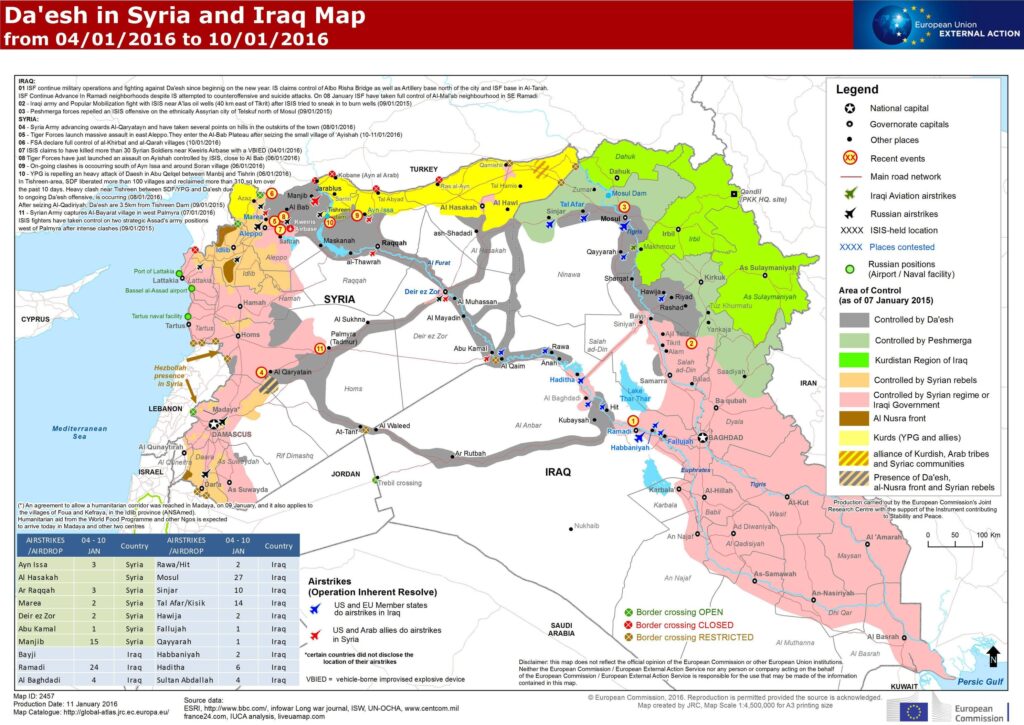An Anti-Daesh Strategy, One With A Chance Of Success
Posted on

Daesh map Credit: European Commission
The current U.S. strategy to destroy the Islamic State (Daesh) is ineffective and is unlikely to succeed. To be successful, the new strategy must be affordable, offer the legitimate hope for an acceptable outcome, and come to resolution within a reasonable timeframe.
- This new approach would be coordinated with regional allies and have three objectives:
- Contain the violence to its current geographic locations and cause no further damage.
- Starve Daesh’s (Breaking Defense doesn’t call these people ISIL) of sustenance and support; and;
- Weaken the underlying causes of violent extremism in an attempt to prevent the rise of an ISIS successor.
At the strategic level, the U.S. would first reverse the existing dynamic and elevate diplomacy to primacy, pushing the military into a subordinate, though crucial, role. The objectives would be secured by taking four mutually reinforcing actions.

Daniel Davis
First, we would stop the thousands of bomber and drone missile strikes. These strikes occasionally take out leaders, yet most of the enemy leaders killed are quickly replaced. These strikes can be counterproductive as they destroy the homes, businesses, and civil infrastructure necessary for a functioning society. It can be argued that these strikes encourage recruitment for the enemy, and give potential members of Daesh an incentive to join in combat.
Combat provides a real adrenaline rush. I’ll admit that as a young second lieutenant in 1991 I—and most of my fellow troopers 2nd U.S. Cavalry—were most eager to fight against the Iraqi Republican Guard. Shortly before the ground war began, Soviet President Mikhail Gorbachev crafted a peace initiative that, if Saddam accepted, would have prevented the war.
Many of us were sick at the thought of having come all that way and not getting to fight. Likewise, depriving these jihadi recruits of the chance to fight will turn their excitement into boredom, undermine the morale of the fighters already there, and seriously diminish the allure for others to join them.
Second, the U.S. will work diplomatically and aggressively with the states surrounding land-locked Daesh to isolate and then strangle them. Right now, the truth is that Saudi Arabia, Iran, Turkey, Jordan, Qatar and others have various and competing reasons to fund and support one party or another in the mess of the fight against Daesh. We need to use our many means of leverage to encourage (and, where necessary, coerce) those states from supporting any of the combatants.
Third, back up that diplomatic engagement with a coordinated military action to fatally interdict supplies, money, and replacement fighters trying to enter Daesh-held territories. There is too vast an area to successfully seal the borders to all traffic in and out of Daesh areas, but they can be severely curtailed. Very limited special operation missions to kill or capture the most senior Daesh leaders will be used, but only when doing so has the potential to make a strategic impact.
Fourth—and as important as any other element—is to conduct a substantial humanitarian effort to aid the struggling civil population in occupied areas. The intent would be to exploit the fact that Daesh is incapable of effectively meeting basic needs of the people by providing what Daesh cannot.
Making heavy use of intelligence and possibly even special forces teams, we would make contact with local leaders to identify ways and locations to deliver their people desperately needed food and other necessities.
We spend billions on our current anti-Daesh strategy by maintaining a steady supply of expensive missiles, keeping fighter jets making constant bombing runs, and the cost of maintaining the support force. According to the Department of Defense, the air campaign by itself costs the US almost $12 million per day, and the Obama administration is seeking $74 billion for the wars in its fiscal 2017 budget (Overseas Contingency Operations). A successful and fully funded plan centered on diplomacy and humanitarian aid, supported by limited military action, would cost a fraction of that figure.
This is not a sexy strategy. It won’t provide compelling video for the television networks. There isn’t a body count for the military to tout. It will probably take longer to work. But this plan has considerable advantages over current strategy. It kills no more innocent civilians via collateral damage. It no longer destroys vital civil infrastructure. It provides humanitarian relief to a suffering population. And, most of all, it provides a legitimate chance to defeat Daesh.
Daesh is a dead man walking. They are going to fail and exit the world stage because they are physically incapable of providing a viable, enduring state. We’ve given the current military-first strategy almost two decades to work.
It hasn’t. The time has come to give alternative, diplomatic-first strategies a chance.
Daniel L. Davis, a retired Army lieutenant colonel, is a foreign policy fellow and military expert at Defense Priorities. Davis deployed four times and was awarded the Bronze Star for Valor at the Battle of 73 Easting in 1991 and a Bronze Star in Afghanistan in 2011.
Subscribe to our newsletter
Promotions, new products and sales. Directly to your inbox.
